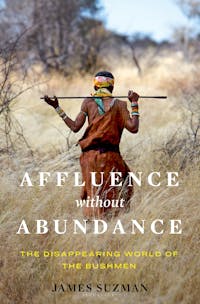Affluence Without Abundance
The Disappearing World of the Bushmen
 Download image
Download image
ISBN10: 1632865726
ISBN13: 9781632865724
Hardcover
320 Pages
$29.00
CA$39.00
If the success of a civilization is measured by its endurance over time, then the Bushmen of the Kalahari are by far the most successful in human history. A hunting and gathering people who made a good living by working only as much as needed to exist in harmony with their hostile desert environment, the Bushmen have lived in southern Africa since the evolution of our species nearly two hundred thousand years ago.
In Affluence Without Abundance, anthropologist James Suzman vividly brings to life a proud and private people, introducing unforgettable members of their tribe, and telling the story of the collision between the modern global economy and the oldest hunting and gathering society on earth. In rendering an intimate picture of a people coping with radical change, it asks profound questions about how we now think about matters such as work, wealth, equality, contentment, and even time. Not since Elizabeth Marshall Thomas's The Harmless People in 1959 has anyone provided a more intimate or insightful account of the Bushmen or of what we might learn about ourselves from our shared history as hunter-gatherers.
Reviews
Praise for Affluence Without Abundance
"Affluence Without Abundance is not simply a description of Bushman life. Mr Suzman deftly weaves his experiences and observations with lessons on human evolution, the history of human migration and the fate of African communities since the arrival of Europeans. The overarching aim of the book is more ambitious still: to challenge the reader’s ideas about both hunter-gatherer life and human nature."—The Economist
"[Suzman creates] a feeling for the landscape, the difficulties encountered by the Bushmen, and the pleasures of their simple, if rapidly changing, way of life . . . In all, this is a delightful book, full of perceptiveness and understanding."—Science
"An insightful and well-written book, describing the hard transition of foraging communities in Namibia from relative affluence during the Stone Age to contemporary poverty and misery. Avoiding both modern conceits and romantic fantasies, Suzman chronicles how economics and politics have finally conquered some of the last outposts of hunter-gatherers, and how much humankind can still learn from the disappearing way of life of the most marginalized communities on earth."—Yuval Noah Harari, author of Sapiens: A Brief History of Human Kind and Homo Deus: A Brief History Of Tomorrow
"This book has truth on every page and is filled with important insights that range from hunting and tracking to how we think about time, money, value or success."—Elizabeth Marshall Thomas, author of The Harmless People and The Old Way
"This beautiful book—part memoir, part ethnography—offers a window into the lives of one of the most enduring of human cultures . . . If you have ever wondered how it might be to measure wealth not by material possessions but by the strength of social relations between people, read this book."—Wade Davis, author of The Wayfinders and Into the Silence
"A spirited ethnography of the ancestral peoples of the Kalahari. . . . A welcome contribution to a once-vibrant anthropological literature without many recent entries."—Kirkus Reviews

